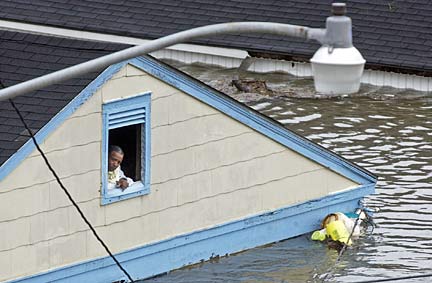
|
Rise in isle
gas prices seen
after Gulf storm
Hurricane Katrina is expected to drive up gas prices nationwide, but some analysts warn that Hawaii could see a more dramatic spike because the state's price cap law ties isle prices to the Gulf Coast market.
Starting Thursday, maximum wholesale gas prices will be set each week in Hawaii based on an average of spot prices in the Gulf Coast, New York and Los Angeles.
Katrina already has affected prices in two of those regions. Wholesale gasoline prices in the New York and the Gulf Coast soared by 25 to 35 cents a gallon yesterday, following reports that more than 8 percent of U.S. refining capacity had been shut down as a precaution ahead of the storm.
Although some refiners said damage at their plants appeared to be minimal, prices could go higher if things are revealed to be worse, analysts said.
"It'll be a bit before we know exactly what the extent of the damage was and, therefore, have a shot at understanding what the supply shortfall and the lost production was," said David Hackett, president of Stillwater Associates, an oil and gas industry consulting firm.

Surrounded by high water from Hurricane Katrina, an unidentified New Orleans resident awaited rescue yesterday in the city's 8th Ward. Katrina plowed into the Gulf Coast at daybreak with shrieking, 145-mph winds and blinding rain, submerging entire neighborhoods up to the roof lines in New Orleans, hurling boats onto land and sending water pouring into Mississippi's strip of beachfront casinos.
Senate Consumer Protection Chairman Ron Menor, one of the key authors of the gas price cap, said he believes it is too early to forecast what will happen to prices in Hawaii.
"If the federal government and private industries intervene to stabilize prices on the mainland in the aftermath of the hurricane, then there shouldn't be any impact in Hawaii's gasoline prices," said Menor (D, Mililani).
One analyst said pump prices nationwide would likely average more than $2.75 a gallon by week's end -- up from $2.61 a gallon last week, according to Energy Department data.
Gov. Linda Lingle said she feared a similar spike in Hawaii prices.
"What happened is, because of the hurricane, oil production is going to be down in the Gulf, which means prices are going to be higher, which means the gas cap is going to be set higher," Lingle said yesterday in a speech to the Chamber of Commerce of Hawaii. "It highlights the problem of tying prices here with somewhere else."
Lingle said her administration was setting up hot lines for consumers, gas stations or industry officials to report any potential problems once the caps are in place.
Wholesale price caps for Thursday through Sunday have been set already, so any increases are likely to be reflected in the price cap calculations being posted tomorrow and effective for the week of Sept. 5.
The current baseline price for wholesale gasoline is $1.87 a gallon, based on conditions in the three target markets from Aug. 17-23. Including taxes and assuming a 12-cent-a-gallon markup traditionally charged by dealers, the cost of regular unleaded on Oahu would be about $2.87 a gallon if oil companies charge the maximum allowed under the price-cap law.
That price is above the record $2.82 per gallon average in Honolulu reported yesterday by AAA's Fuel Gauge report. The statewide average for regular unleaded also was at a record $2.90 a gallon, according to the auto club.
John Tantlinger, a program manager in the Department of Business, Economic Development and Tourism, said Hawaii's gasoline prices probably would have been affected by the hurricane, but not as directly as it will be under the gas cap formula.
"It transfers the volatility of prices of those markets directly to our prices," he said.
Hackett said Hawaii prices might not have been affected by the hurricane at all.
"Gas prices in Hawaii have nothing to do, at the end of the day, with California refinery performance or Gulf Coast hurricanes," he said. "Hawaii gas prices pretty much did what they do, which is come up slowly and come down slowly."
Stillwater was commissioned by the state to study Hawaii's gasoline market in 2002, after the administration of then-Gov. Ben Cayetano settled its $2 billion price-fixing lawsuit against oil companies for $20 million. The firm said it did not think price caps would work.
House Majority Leader Marcus Oshiro said the Public Utilities Commission should use this opportunity to determine whether the baseline markets are appropriate for calculating the price caps.
Under the law, the PUC has authority to adjust the price cap formula to more accurately affect the market.
"The PUC will be tested by how it reacts to the affects of the hurricane on these markets," said Oshiro (D, Wahiawa-Poamoho). "They're monitoring the situation hour by hour, day by day. They're in the best position to make the most informed decision."
E-mail to City Desk
[News] [Business] [Features] [Sports] [Editorial] [Do It Electric!]
[Classified Ads] [Search] [Subscribe] [Info] [Letter to Editor]
[Feedback]
